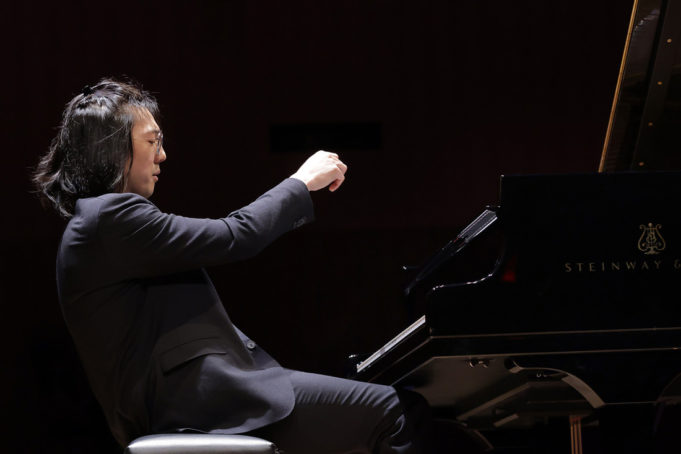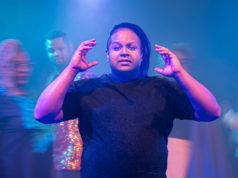A scant three years since the last Van Cliburn International Piano Competition, we are back at Van Cliburn Recital Hall at TCU for the first two rounds of the 2025 edition of the contest. My coverage this year will contain a bit less local color, since I am following the competition remotely for the first time in this century. Fortunately, either the Cliburn is providing me with better audio or I just have better speakers hooked up to my laptop, because I am picking up audience members coughing and cell phones going off as if I were in the auditorium.
Also, I was watching the performances this past week at the same time that I was covering soccer matches during the last weekend of the seasons in England, Italy, and Spain. For a hot second, I thought Yoo Sung-ho was playing midfield for Wolverhampton instead of playing Bach and Rachmaninov in Fort Worth. I’ll try to avoid such errors while writing this.
This year’s contest has fewer Russians than usual, possibly because of the pressure they’d be under because of Russia’s stalled invasion of Ukraine. In their absence, six Chinese pianists filled the void, as well as others of Chinese extraction, representing Hong Kong, Malaysia, and the United States. Another, more worrying trend was contestants’ cancellations, as Anastasia Vorotnaya (Russia) and Korkmaz Can Sağlam (Türkiye) cited undisclosed health reasons as they withdrew from the competition before it started. Later on, after passing the preliminary round, Ju Xiaofu (China) sat down to play his quarterfinal recital, looked at his hands, and left the stage without playing a note. Officially, he pulled out for medical reasons.
The withdrawals meant that only 10 pianists were eliminated in the first round, but I still found some players I wanted to hear more from. Wu Xuanxiang (China) skipped his Juilliard graduation to perform here, and while his Liszt was dull, I rather liked his feel for German music when he played Beethoven’s 24th Piano Sonata and Brahms’ Intermezzo in B-flat minor. Pedro López Salas (Spain) played a Ginastera Piano Sonata that was the right amount of brittle, and Kotaro Shigemori (Japan) performed a fine Scriabin Second Piano Sonata. The elimination that shocked me the most at this stage was Cheng Jiarui (China), whose Brahms Intermezzo in A major came correct with sturdiness and delicate beauty. He followed that with a Scriabin Fifth Piano Sonata that started out shakily but found an ecstatic groove.
The quarterfinal round also had some unwelcome casualties, with Alice Burla (Canada) exiting despite her programs of well-played, less-familiar pieces, like her cool-headed rendition of Ligeti’s “Fanfares.” She slipped easily into the different idioms of Fauré’s Nocturne in D-flat major and Szymanowski’s Variations on a Polish Folk Theme. I thought David Khrikuli (Georgia) was a surefire pick for the semifinals, so good was he with his assortment of Scriabin pieces and his electrifying reading of Liszt’s 15th Hungarian Rhapsody. His second round was marred by some Brahms selections that didn’t fit him. Was that why he went out?
Of the 12 pianists remaining, two are returnees to the Cliburn. I didn’t think much of Cai Yangrui (China) when he played here three years ago, but he showed significant improvement this time around, applying some nice understatement to Liszt’s transcription of Wagner’s Tannhäuser Overture before letting loose in Scriabin’s Fantasy. For his part, Vitaly Starikov (who now represents Israel as well as Russia) turned in a bright performance of Mozart’s Allegro and an appropriately madcap version of Shostakovich’s Piano Sonata.
My favorites so far have included Elia Cecino (Italy), who had an iron grip on the structure of Mendelssohn’s Variations sérieuses but also showed a sense of humor in Liszt’s transcription of Gounod’s Waltz from Faust and effortlessly traversed the Russian repertoire in Scriabin’s Third Piano Sonata and Shostakovich’s Prelude and Fugue in B-flat major. Piotr Alexewicz (Poland) appeared to be at his best in the more obscure material he played, and Carter Johnson (USA), who looks like a thinner and younger version of Jesse Plemons, made the fascinating choice to alternate Brahms and Shostakovich pieces to show a kinship between these two quite different composers.
The bowtie-wearing Aristo Sham (Hong Kong) displayed some frightening technical ability in his version of Ravel’s Gaspard de la Nuit and managed to play Beethoven’s “Hammerklavier” Sonata with some endearing brashness that kept the piece from collapsing under its own weight. As for Jonas Aumiller (Germany), he defied the stereotype of the German pianist who prefers pieces that allow him to stare at the ceiling while he plays. Like many of his compatriots, the Munich native is quite good at transporting the listener to a state of mystical reverie, but he does it with non-German pieces like Scriabin’s Fantasy and Debussy’s “Feux d’artifice.” All this gives us plenty to look forward to as the competition moves to Bass Hall for its semifinal round this week.












